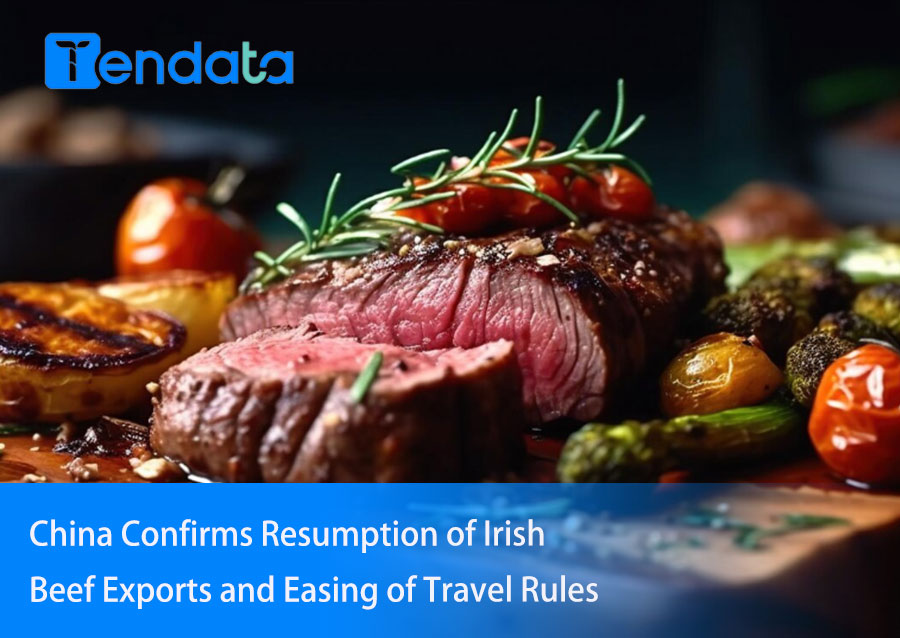 Trade Trends News
Trade Trends News
 19-01-2024
19-01-2024

Irish beef exports to China could resume immediately after the Chinese government confirmed it would reopen the Irish market during Premier Li Qiang's visit to Dublin.
The announcement was made by Prime Minister Leo Varadkar following a meeting with Li Keqiang. Li is widely regarded as China's number two figure after Xi Jinping.
During a one-day visit to Ireland, the agenda for talks between Varadkar and Li included bilateral relations, including trade and economic relations, China-Europe relations and issues such as climate change, the Middle East and the war in Ukraine.
President Michael D. Higgins and Mr. Varadkar also raised Ireland's concerns about human rights in China with Mr. Li.
Last November, the Chinese market was closed to Irish beef after the Department of Agriculture found a cow infected with atypical mad cow disease during a routine inspection.
This reopening was much quicker than the scare associated with mad cow disease, commonly known as BSE, prior to 2020, when exports to China were suspended for 2.5 years.
News that exports could resume was welcomed by the Irish Farmers Association (IFA) and the Irish Creamery Milk Suppliers Association (ICMSA).
While the Irish government is hopeful that business in China will grow, last year Ireland exported just a fraction of the more than €2.7 billion worth of beef to China.
Prior to the suspension in May 2020, exports to China in 2019 were valued at €38.8 million, with exports to China valued at around €25 million between April and October, the short period when market access was restored.
The Prime Minister said that China has accepted Ireland's scientific data that the case of mad cow disease is atypical.
"This allows us to reopen export markets, which is important for Irish farmers ...... The more markets we have, the better prices we get and the less risk of volatility," he said.
Varadkar said the restoration of market access was one of two "tangible outcomes" of his meeting with Li Keqiang.
The other was China's easing of travel rules for Irish citizens, who will be allowed to stay for up to 15 days without a visa.
Mr. Li's activities in Dublin began with a meeting with Mr. Higgins in Áras an Uachtaráin to discuss climate change, global poverty, food security and conflict.
In a brief exchange open to the media, Mr. Li told Mr. Higgins through an interpreter that cooperation between China and Ireland had been "steadily advancing and bearing fruitful results".
He added: "Our relationship has set a model for mutually beneficial cooperation between countries with different political systems, cultural differences and geographical areas."
Human rights groups have long criticized China's treatment of the Muslim Uighur people in Xinjiang and its crackdown on freedom in Hong Kong.
Áras an Uachtaráin confirmed that human rights issues were discussed during the talks, with Mr. Higgins citing points that could be raised during China's universal periodic review by the UN Human Rights Council this month.
Speaking after his meeting with Mr. Li in Farmleigh, Mr. Varadkar said he "raised with us concerns about the situation in Xinjiang, Tibet and Hong Kong ...... as well as the upcoming trial of Hong Kong newspaper publisher Lai Chi-ying."
Mr. Varadkar said Ireland's human rights concerns related to the issue of China's Special Autonomous Region (SAR), and that Ireland's view was that "we need to be frank about these things, and that China is a member of the United Nations Human Rights Council and has international responsibilities".
Mr. Varadkar added: "Any country, including our own, should be judged by the way it treats minorities."
Asked about Li Keqiang's response, Varadkar said the Chinese delegation was willing to ask such questions, but he also said, "It's fair to say that they would have a very different view of the facts and dispute a lot of what has been said about China."
Category
Leave Message for Demo Request or Questions


 T-info
T-info T-discovery
T-discovery

 My
Tendata
My
Tendata Market Analysis
Market Analysis Customer
Development
Customer
Development Competitor
Monitoring
Competitor
Monitoring Customer Relationship
Customer Relationship





































































































































